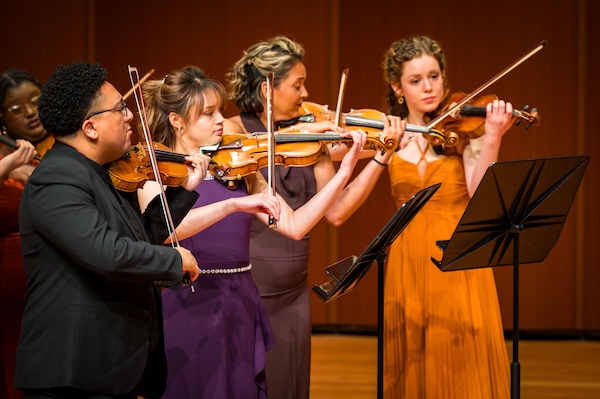Classical Concert Review: Sphinx Virtuosi play Joplin, Coleridge-Taylor, Skye, Stewart, Becenti, Carreño, and Taylor
By Jonathan Blumhofer
The Sphinx Virtuosi is terrific: the group’s unified tone and articulations, impeccable responsiveness and technique, and command of stylistic nuance are all of the first rank.

Sphinx Virtuosi in action. Photo: Troy B. Thompson, courtesy of the College of the Holy Cross
“What happens when we bring…outside music, inside?” composer Curtis Stewart asks in the program note for Drill, his eight-minute-long joy ride for prepared drum set and strings.
That’s a great question. Even though it wasn’t fully answered (or thoroughly explored) during Sunday afternoon’s Music Worcester debut from the Sphinx Virtuosi, the program’s bracing lineup of works by Black and Latino composers past and present provided more than a little food for thought.
An offshoot of the Detroit-based Sphinx Organization, the 18-member Virtuosi are an invigorating establishment to encounter live. Their ensemble is terrific: the group’s unified tone and articulations, impeccable responsiveness and technique, and command of stylistic nuance are all of the first rank. That, like Orpheus Chamber Orchestra, they play without a conductor, only enhances the brilliance of their product.
Those strengths emerged clearly in the Virtuosi’s performance of the oldest selection on Sunday’s program at College of the Holy Cross’s The Prior Performing Arts Center, the finale of Teresa Carreño’s Serenade for Strings. Dating from 1895, the score presents the incongruous image of a Venezuelan composer living for a spell in rural Austria. Nevertheless, on Sunday the music’s considerable charms—from its piquant harmonic turns to its dancing approach to the march genre—prevailed.
So did the characteristic aspects of two movements from Samuel Coleridge-Taylor’s Four Novelletten. The score, published in 1903, demonstrates the English composer’s keen grasp of the string ensemble (he was a violinist by training, first taught by his grandfather) and also an awareness of contemporaneous works for that instrumentation by, among others, Tchaikovsky.
Certainly, both sections that were heard on Sunday seemed to make nods, here and there, to the older composer’s Serenade for Strings. Yet they were hardly derivative. The opening Allegro moderato was flowing and elegant. Meantime, the third movement, with its wistful phrases, soaring violin solos, and abbreviated turns to the major mode delivered a beguiling slant on a familiar musical form.
Equally fresh was the afternoon’s reading of the Overture to Scott Joplin’s only opera, Treemonisha. Arranged from a new revision of the score that receives its American premiere in May, Sunday’s strings-only account proved surprisingly rich and sumptuous—but still managed to snap and swing as and when it should.
So did Levi Taylor’s Daydreaming. Subtitled “A Fantasy on Scott Joplin,” his is an homage of the invigoratingly subtle type that the Virtuosi dispatched with a good measure of panache.
In Juantio Becenti’s Hané (Story), the collective’s excellent balances and close attention to dynamic contrasts helped to underline the music’s sense of sonic space—and also make level some of its choppy transitions. Written when the composer was just seventeen, the last is perhaps to be expected. Even so, the score contains more than a few striking moments, both of the lyrical variety and, in its scampering, Shostakovich-worthy episodes, the vigorous.
One wouldn’t have minded a bit more of the last (also, maybe, grittier dissonances) in Derrick Skye’s American Mirror: Part 1. A tribute to the principle of the United States functioning as a cultural melting pot, the score draws on various African and European musical techniques and scales.
Some of the former—thick canonic textures, instrumentalists sustaining pitches by humming quietly while they’re playing—are quite effective. And, indeed, it’s remarkable how many gestural similarities one could pick out of the music’s varied source materials. At the same time, Mirror’s overarching aspirational tone (parts of it might make for a lovely soundtrack to a Ken Burns-style documentary) felt a bit pat.
For music that jibed more readily with the urgencies of the day, there was Stewart’s Drill. Explosive, skittish, and exhilarating—at least when played by the Virtuosi and percussionist Josh Jones—this paean to urban release carried the afternoon before it. While inverting the expected order of things (“outside music, inside”) involves some risk, the music seemed to say, such boldness can be worthwhile. Sometimes, too, it suggested, such actions may be outright necessary.
Jonathan Blumhofer is a composer and violist who has been active in the greater Boston area since 2004. His music has received numerous awards and been performed by various ensembles, including the American Composers Orchestra, Kiev Philharmonic, Camerata Chicago, Xanthos Ensemble, and Juventas New Music Group. Since receiving his doctorate from Boston University in 2010, Jon has taught at Clark University, Worcester Polytechnic Institute, and online for the University of Phoenix, in addition to writing music criticism for the Worcester Telegram & Gazette.
Tagged: College of the Holy Cross’s Prior Performing Arts Center
